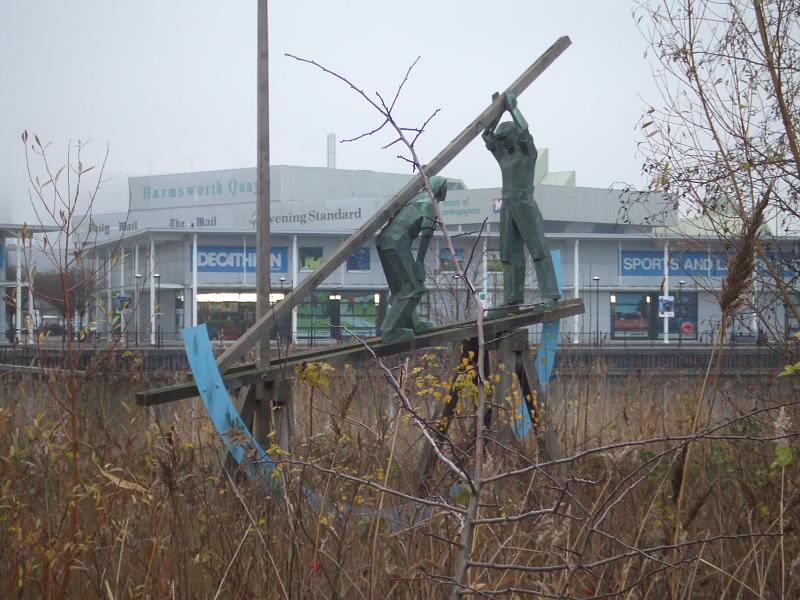Deal Porters on:
[Wikipedia]
[Google]
[Amazon]
 The deal porters were a specialist group of workers in
The deal porters were a specialist group of workers in
Many hands: Trades of the Port of London, 1850-1980
Marine occupations Obsolete occupations Port of London {{UK-stub
 The deal porters were a specialist group of workers in
The deal porters were a specialist group of workers in London
London is the capital and largest city of England and the United Kingdom, with a population of just under 9 million. It stands on the River Thames in south-east England at the head of a estuary down to the North Sea, and has been a majo ...
's docks. They handled baulks of softwood
file:Pinus sylvestris wood ray section 1 beentree.jpg, Scots Pine, a typical and well-known softwood
Softwood is wood from gymnosperm trees such as conifers. The term is opposed to hardwood, which is the wood from angiosperm trees. The main diff ...
or "deal", stacking them up to 60 feet (18 m) high in quayside warehouses. This was a demanding and dangerous job. It required physical strength, dexterity and a head for heights
To have a head for heights means that one has no acrophobia, an irrational fear of heights, and is not particularly prone to fear of falling or suffering from vertigo, the spinning sensation that can be triggered, for example, by looking down fro ...
, to such an extent that they were nicknamed "Blondins" after the famous acrobat, Charles Blondin
Charles Blondin (born Jean François Gravelet, 28 February 182422 February 1897) was a French tightrope walker and acrobat. He toured the United States and was known for crossing the Niagara Gorge on a tightrope.
During an event in Dublin in ...
. Deal porters wore special leather headgear (backing hats) with long "aprons" over their shoulders in order to protect their heads and necks from wooden splinters.
Their trade was a notably hazardous one. The ''New Survey of London Life and Labour'', published in 1928, noted:
:''"Deal portering is heavy and dangerous work which cannot safely be undertaken by any save experienced men. The shoulder of an experienced deal porter is said to develop a callosity which enables it to bear the weight and friction of a load of planks. But even with a hardened shoulder the deal porter has an unenviable task. To carry over a shaking slippery plankway a bundle of shaking slippery planks, when a fall would almost certainly mean serious injury, is work for specialists."''
Most of the deal porters worked at the Surrey Commercial Docks
The Surrey Commercial Docks were a large group of docks in Rotherhithe, South East London, located on the south bank (the Surrey side) of the River Thames.
The docks operated in one form or another from 1696 to 1969. Most were subsequently fi ...
in Rotherhithe
Rotherhithe () is a district of south-east London, England, and part of the London Borough of Southwark. It is on a peninsula on the south bank of the Thames, facing Wapping, Shadwell and Limehouse on the north bank, as well as the Isle of Dogs ...
, which specialised in timber. The workers were represented by the Port of London Deal Porters' Union
The Port of London Deal Porters' Union was a trade union in the United Kingdom. It merged with the Transport and General Workers' Union in 1939. The union represented deal porters, who handled baulks of imported softwood at the Port of London, pr ...
. They were eventually rendered obsolete by the 1940s as mechanisation provided a better and cheaper way of moving timber cargo, and less arduous jobs became available elsewhere.
There are a number of commemorations of the deal porters in Rotherhithe. At Canada Water
Canada Water is an area of the Docklands in south-east London. It is named after a freshwater lake and wildlife refuge. Canada Water tube, Overground and bus station is immediately north of the lake, along with Canada Water Library which ov ...
there is a sculpture in their honour, designed by Philip Bews. There is a street named "Deal Porters Way", a path named "Deal Porters Walk", and a public square alongside Canada Water Library named "Deal Porters Square". The Compass pub in Rotherhithe Street was formerly named "The Deal Porter".
References
Many hands: Trades of the Port of London, 1850-1980
Marine occupations Obsolete occupations Port of London {{UK-stub